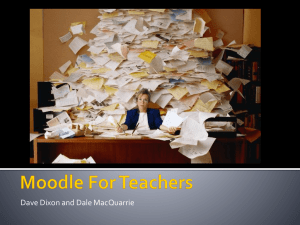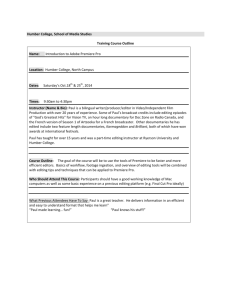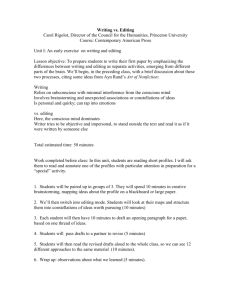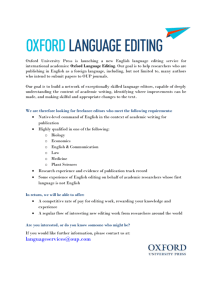Introduction to Film Editing-Online Course MAR 112A.50 OVERVIEW
advertisement
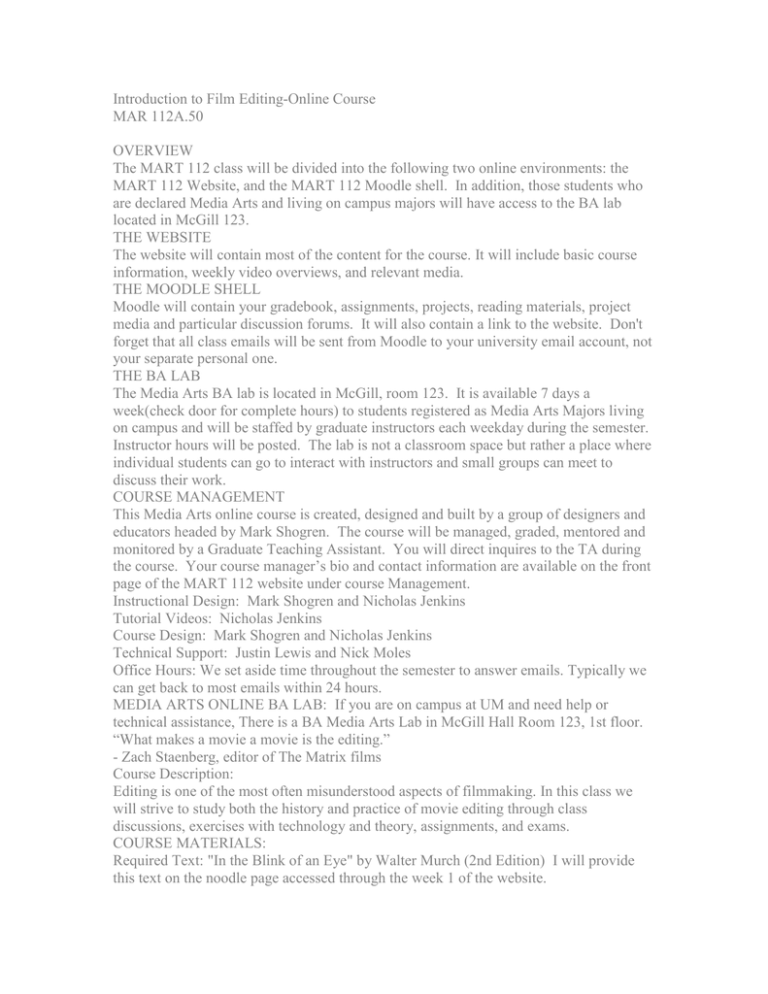
Introduction to Film Editing-Online Course MAR 112A.50 OVERVIEW The MART 112 class will be divided into the following two online environments: the MART 112 Website, and the MART 112 Moodle shell. In addition, those students who are declared Media Arts and living on campus majors will have access to the BA lab located in McGill 123. THE WEBSITE The website will contain most of the content for the course. It will include basic course information, weekly video overviews, and relevant media. THE MOODLE SHELL Moodle will contain your gradebook, assignments, projects, reading materials, project media and particular discussion forums. It will also contain a link to the website. Don't forget that all class emails will be sent from Moodle to your university email account, not your separate personal one. THE BA LAB The Media Arts BA lab is located in McGill, room 123. It is available 7 days a week(check door for complete hours) to students registered as Media Arts Majors living on campus and will be staffed by graduate instructors each weekday during the semester. Instructor hours will be posted. The lab is not a classroom space but rather a place where individual students can go to interact with instructors and small groups can meet to discuss their work. COURSE MANAGEMENT This Media Arts online course is created, designed and built by a group of designers and educators headed by Mark Shogren. The course will be managed, graded, mentored and monitored by a Graduate Teaching Assistant. You will direct inquires to the TA during the course. Your course manager’s bio and contact information are available on the front page of the MART 112 website under course Management. Instructional Design: Mark Shogren and Nicholas Jenkins Tutorial Videos: Nicholas Jenkins Course Design: Mark Shogren and Nicholas Jenkins Technical Support: Justin Lewis and Nick Moles Office Hours: We set aside time throughout the semester to answer emails. Typically we can get back to most emails within 24 hours. MEDIA ARTS ONLINE BA LAB: If you are on campus at UM and need help or technical assistance, There is a BA Media Arts Lab in McGill Hall Room 123, 1st floor. “What makes a movie a movie is the editing.” - Zach Staenberg, editor of The Matrix films Course Description: Editing is one of the most often misunderstood aspects of filmmaking. In this class we will strive to study both the history and practice of movie editing through class discussions, exercises with technology and theory, assignments, and exams. COURSE MATERIALS: Required Text: "In the Blink of an Eye" by Walter Murch (2nd Edition) I will provide this text on the noodle page accessed through the week 1 of the website. Required Software: It's important to understand that this is primarily a History and Theory class, but there will be five projects that will require you to have editing software. In the online version of this class, I teach an introduction to Adobe's editing system, "Premiere". The tutorials you will see in this class will be made in Adobe Premiere Pro 5.5, but should work just fine for 4.0, 5.0, 5.5, and 6.0. You are required to have access to a computer that has one of these versions. Remember that you get a great on Adobe.com for a subscription to Adobe Creative Cloud. We will be directing you to resources both here at the University and across the web for help getting started with Adobe Premiere. Course Films: In this class you will be required to watch 3 films. The films will be watched outside of class so it will be your responsibility to procure them and watch them when they are assigned. 1. Inception (2010) 2. Hugo (2011) 3. Cold Mountain (2003) Course Expectations: Students will develop the abilities to… •Articulate theories and practices of editing both written and verbally. •Understand the history of editing and the role of editors in the history of cinema. •Critically Analyze films and scenes in films for theories and practices of editing. •Prove basic competency in a non-linear editing software. Course Requirements: There are 200 points possible in this class. These points are divided into four categories. 1. Online Discussions 2. Weekly Assignments 3. Exams and Quizzes 4. Projects Grading Guidelines: I have sought to make grading as clear as I can. If you have any questions, please contact me. 1. Online Discussions. The Forum Discussions will be graded thusly: •Participation – you will be required to make a certain amount of posts for each discussion as well as a certain amount of responses. Each discussion will list the requirements for participation at the start. •Vocabulary – You will be expected to communicate your ideas using terms and ideas we have discussed in readings, assignments, and lectures. 2. Weekly Assignments. You will be expected to complete the assigned exercises and projects within the given dates (usually a 7 day period). Each assignment is different but all of them are exercises used to gauge your understanding Editing Theory and software. •Completion – The assignments will be made available for a certain amount of time on Moodle and you will have until the Units are taken offline to complete them. Everything will be submitted on Moodle OR through Email. It will be clear in each assignment how that assignment should be submitted. 3. Exams and Quizzes. There are various quizzes and exams in this class. Each one will be timed and will test you on a wide variety of elements in the class. First and foremost, you will be tested on the readings and have exams on History and Theory discussed in our online forums. 4. Projects There are five software-based editing projects. Each project will measure your ability to understand ability to work with software to create very small movies. Grade Breakdowns Are As Follows: Grade A AB+ B BC+ C CD+ D F Points 185 - 200 points and above 179 - 184 points 173 - 178 points 165 - 172 points 159 - 164 points 153 - 158 points 145 - 152 points 139 - 144 points 133 - 138 points 120 - 132 points 119 points and below HOW TO SUCCEED IN THIS CLASS 1. Visit this Moodle Page several times per week. Make sure you check for all recent announcements and DOUBLE CHECK that you have turned in all assigned work before the deadline. 2. Devote time to your work. Not only should you be committing to THINK about what you write, but you should also proof your work before you turn it in to me. If I can't understand what you've written, then you won't get a grade for it. 3. Contact the Teachers Assistant. Never feel as though you are bothering us with emails. It is our responsibility to answer your emails and help you with problems relating to this class, but it is YOUR responsibility to ask the questions. Again, we are here to answer questions but keep your expectations realistic in terms of when you ask and when you receive a reply. Although i may answer questions at odd times, as a general rule I and my teachers assistants are available 8-5 during weekdays. All students must practice academic honesty. Academic misconduct is subject to an academic penalty by the course instructor and/or a disciplinary sanction by the University. All students need to be familiar with the Student Conduct Code. The Code is available for review online at http://www.umt.edu/SA/vpsa/index.cfm/page/1339 “Students with disabilities may request reasonable modifications by contacting me. The University of Montana assures equal access to instruction through collaboration between students with disabilities, instructors, and Disability Services for Students (DSS). “Reasonable” means the University permits no fundamental alterations of academic standards or retroactive modifications. For more information, please consult http://www.umt.edu/disability.” Edit Content
